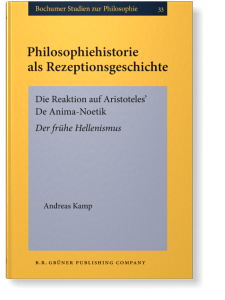Philosophiehistorie als Rezeptionsgeschichte
Die Reaktion auf Aristoteles' De Anima-Noetik
Der frühe Hellenismus
Kein Theoretiker provozierte über eine ähnlich lange Zeitspanne eine so intensive, kontinuierliche und multikulturelle Rezeption wie Aristoteles. Die Geschichte der Philosophie verlangt es daher geradezu, unter der Perspektive der ebenso konstanten wie vielgestaltigen Auseinandersetzung mit “dem Philosophen” analysiert zu werden. Den geeignetsten Kristallisationspunkt hierfür stellt die in “De Anima” G 4-5 präsentierte Nous-Theorie dar, denn zum einen stand sie im Zentrum des aristotelischen “Systems”, zum anderen handelt es sich bei ihr um die mit gröîter Kontinuität, höchster Intensität und unterschiedlichsten Resultaten rezipierte philosophische Theorie überhaupt.
Der vorliegende Band thematisiert, im Anschluî am die “Topographie” der aristotelischen Noetik, die frühhellenistische Resonanz. Den ersten Schwerpunkt bildet Theophrasts philosophisch-kritische Auseinandersetzung mit der Nous-Konzeption seines Lehrers, den zweiten die “De Anima”-Rezeption in der damaligen Philosophie-Szene, die im wesentlichen durch drie Gruppen konstituiert wurde: Theophrasts Kollegen im “Peripatos” (Dikaiarch, Aristoxenos); Theophrasts eingene Hörerschaft (Demetrios v. Phaleron, Menander, Erasistratos); und die zahlreichte philosophische Konkurrenz: die “Akademiker”, “Sokratiker”, und die Schulen Epikurs bzw. Zenons. Die Analyse der relevanten Texte führt erstens zu einder grundsätzlichen Neubewertung der philosophiehistorischen Position Theophrasts. Zweitens dokumentiert sie, daî die aristotelische Theorie entgegen der heutigen opinio communis gerade im Frühhellenismus eine erstaunlich bescheidene Rolle spielte. Rezeptionsgeschichtlich kommt dem von Strabon/Plutarch berichteten und in der neueren Forschung heiîdiskutierten Verlust der aristotelischen Originalmanuscripte deshalb allenfalls eine sekondäre Bedeutung zu.
Published online on 26 May 2011
Table of Contents
-
Einleitung | p. 1
-
1. <Topographie> der aristotelischen Noetik | p. 31
-
2. Theophrast und seine Zeit | p. 58
-
Literaturverzeichnis | p. 258
-
Personenregister | p. 303
Cited by (3)
Cited by three other publications
This list is based on CrossRef data as of 26 october 2024. Please note that it may not be complete. Sources presented here have been supplied by the respective publishers. Any errors therein should be reported to them.
